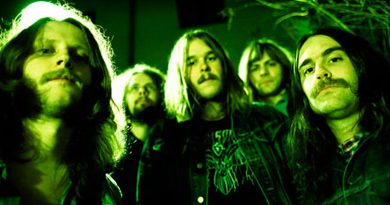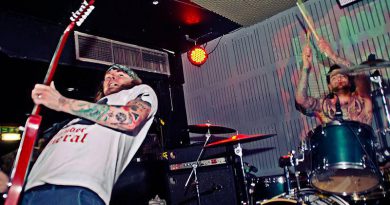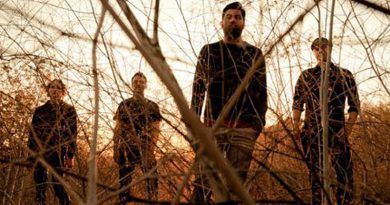In Search Of Tone: David Majury Of Slomatics
If you don’t know Slomatics, then let me help out from under the rock I was just freed from. They’re a three piece that create sounds so immense, you would expect at least five to six members. Listening to their albums is similar to binge watching a Netflix show. You keep listening to the next song, praying it’s not the last one.
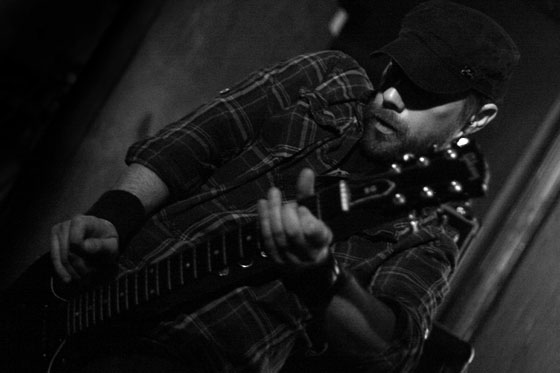
David Majury is one of the two guitarists, and I was thrilled when he agreed to be part of the In Search of Tone series. He has a very unique way of writing music and, as he states below, coming from a DIY punk scene allows for free thinking when creating riffs.
Slomatics have an interesting line up. Two guitarists and a drummer, no bass. How did that come about and do you have to compensate for not having a bass player?
It wasn’t really something we thought about at the beginning. We had formed straight out of the ashes of a five piece, and thought being a three piece would suit how we intended to sound much better, as we were going for a much more repetitive and simplistic sound. None of us were bassists so it would have seemed strange to switch instrument just because convention dictates what a trio should be like. We came out of the Belfast DIY punk scene which was amazingly free thinking, you’d see a grindcore band play with a jazz two piece on the same bill. So the thought of ‘needing’ a certain line up never crossed our minds.
As for compensating, I don’t think we try to – we have a very specific idea about guitar sounds and that happens to involve a lot of low frequencies, so all of our equipment and tuning/set up is geared towards that. We’ve certainly never attempted to replicate a bass, that’s a separate instrument which occupies a different sonic space. Our sound is based around what we can wring out of two guitars and a drum kit!
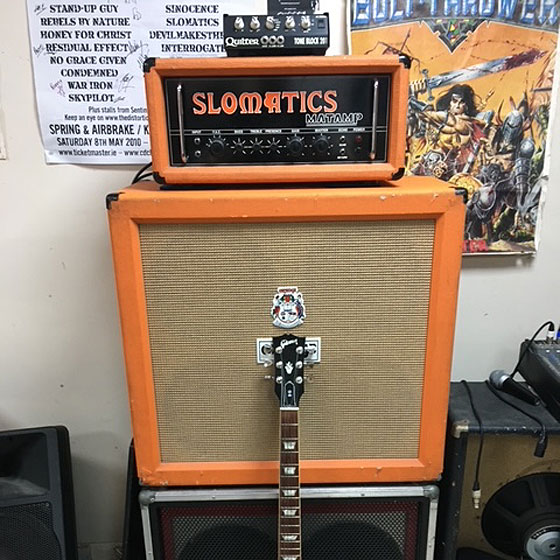
How do you guys create guitar parts and tones to coincide with each other and not get each other’s way?
I suppose one thing about having only two guitars to fill all the frequencies is that we have to try and make space for each other, whilst covering as much ground as we can. When we’re working on new stuff, we always listen to each other and try to make sure we aren’t getting in the way of what each other is doing.
Maybe more importantly, our guitar sounds are quite different – Chris [Couzens] has a much cleaner, but also bassier sound than I do, with mine being fuzzier and much more middy, so hopefully the two sounds complement each other. At least that’s the aim. It really does start to disappear down a wormhole – like Chris only has neck pickups in his guitars, and uses 10 inch speakers, whereas I only use the bridge and 12s. On top of that Chris is a really good technical guitar player, whereas I’m a barre chord caveman, so Chris will play chords and notes in different positions to me to just add that subtle spread.
Having said all that, our aim has always been that the guitars are like one wall of solid noise live, like you’re getting the full frequency but in stereo from the stage. How successful we’ve been is really up to the audience to decide!
With six albums under your belt, has your writing process changed from album to album and what do you currently do to create new unique music?
I’m not sure it’s changed hugely over time to be honest, at least since Marty [Harvey – drums] joined. I write riffs all the time and will usually try to bring something in an approximate form into the rehearsal space, but it’s really there that songs come to life. I’ll often have a very clear idea, but Marty has a tendency to completely turn that on its head, in a good way. It works well, I think we all know our strengths and try to play to them, and no-one is too precious about anything. If one of us doesn’t like an idea, it’s gone.
We’d like to think that with each recording we have tried to push all the elements of our sound a bit further, like Chris adding synths and in particular Marty’s vocals. I’ve pretty much banged out the same Neanderthal dirge from day one! I think we’ve been pretty satisfied with each recording we’ve done since A Hocht, but at the same time it’s never too long after a session we’re plotting what we’ll do differently next time.
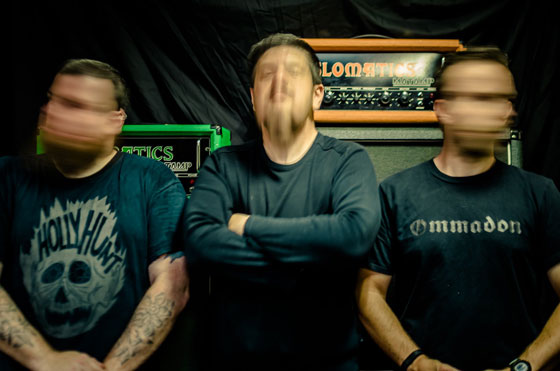
One day I’ll play something on guitar, the next day I’ll attempt to play again and it’ll sound terrible. I’ll get discouraged and stop playing for a little bit. What do you do on off days and how do you get inspired to play again?
I think that’s just how being a guitar player is. I sit and play a lot at home and I’m constantly recording wee thirty second riffs onto my phone, but really only about 5% of them are any good, and what sounded like a great idea yesterday usually sounds rubbish today. Accepting that is a step forward – like I can’t imagine it’s any different for J Mascis or whoever, so I just don’t worry about it.
If I’m trying to write for a new release and I’m getting stuck, I find it really useful to go away and listen to music that sounds as far removed from what I’m trying to write as possible. For me stuff like Stereolab, Can or Tangerine Dream will be much more inspirational when it comes to writing, than Black Sabbath or whatever. It’s putting your brain in a different space, how music which sounds nothing like ours can capture whatever feeling, or emotion, I was aiming at successfully and can be really inspiring when it comes to writing our own stuff.
Do you have a song, or even part of a song, you’re particularly proud of writing?
I haven’t really thought about that before – to be honest I’m always thinking about what we’re doing next, so my favourite song is probably whatever we’re working on right now. I do remember when we started out at first, one of, if not the very first song we wrote was Running Battle and I remember being very happy that we’d written what seemed like a ‘proper’ song using only three notes.
When our original drummer quit and Marty joined we revisited and actually re-recorded that song to do it justice, and I was glad that we had a version that sounded like it should at last. So I suppose that song as much as any, it’s something an absolute beginner could learn in five minutes, which is as good an analogy for our sound as any! One thing I’d say I definitely am proud of is our output – 2020 was only the second year in our 17 year existence that we didn’t release new music, and we’ll make up for that with three records this year. A lot of bands take years to release anything, and there ends up being very little to document them. This isn’t a full time thing, we all have jobs and families, so when we eventually retire permanently to our rehearsal space, I think I’ll be able to look back with pride that we made the most of our time.
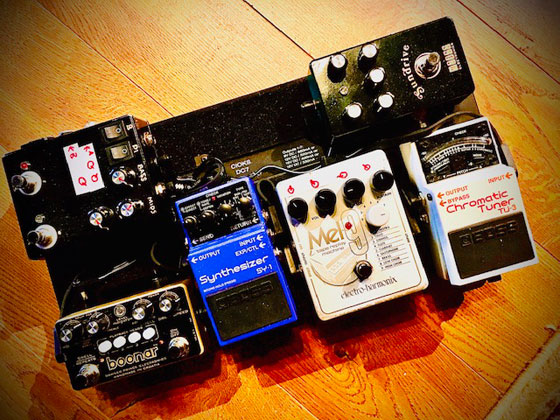
Moving on to the endless amount of gear! I feel you guys have nailed the fuzz guitar tone. I’m listening to the Live at Roadburn album as well and it’s perfect live. What amps are you currently using to achieve these sounds and do they differ from studio to live?
The Roadburn set was using the festival backline – we both used a guitar stack and bass rig together. Both of us had an Ampeg SVT with bass cab, I think Chris’s amp was a newer Orange – mine was an old Hiwatt DR103, the David Gilmour amp. It was really amazing. We like to think that we can make pretty much any half decent backline work for us, and of course Roadburn only has great gear. Usually we’ll just ask for a loud clean valve head – a lot of festivals use modern Orange amps which are all pretty good.
For local shows and recording we use our own gear of course. We both use Matamp 120s, which are pretty much one trick ponies, but they’re just perfect for our stuff. We also bi-amp with Quilter 201 solid state amps – they’re these really tiny, but super loud, amps that we bought after hearing Part Chimp use them. They’re great for fly in shows, but also pair really well with the Matamps.
We rehearse, record and gig at the same volume so we always have the same sound. We use different cabs too, I’ve an Orange cab with 400 watt speakers in it, Chris had Matamp build him an oversized 4×10 with hybrid bass/guitar speakers, again just to blend sounds. We both have custom 2×12 cabs built by a BBC audio engineer too, those things have more low end than any bigger cabs. They’re great.
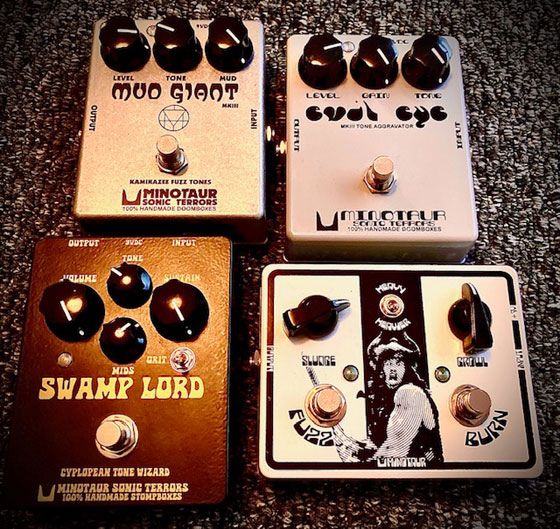
There’s an endless sea of pedals out there with more being made each day. What pedals are you currently using and do experiment and change them often?
We’re definitely guilty of being pedal nerds. We’ve always been into looking for new sounds but to be honest we’ve been using smaller pedalboards for a while now, and trying to limit what we use to the essentials. They’re easier to fly with, and nothing much has changed for a few years now.
I use an EHX Pog for some textural stuff, a MEL9 synth, and then a MXR Phaser and Analog Delay. Nothing fancy. I’ve used the same fuzz pedal since 2004, a DAM Meathead. The vast majority of the time it’s just the fuzz. I do like trying other fuzzboxes though, recently I’ve been using a few Minotaur Sonic Terrors boxes which are really amazing, they’re very old school like DAM, just quite simple but really well made pedals. I like their Evil Eye and Swamp Lord a lot.
We both use the Frost Giant Massif a lot too, it’s kind of like a Meathead but with huge mids. We’re lucky in having Moose Electronics nearby too, their builder Cian is a good friend and has built us some incredible pedals – his Nomad octave fuzz is just wonderful.
Chris has a slightly more complicated pedalboard, he uses a Moose SunDrive for gain, then two different synths, the MEL9 and a Boss SY1, which he uses a lot to add layers to the sound. From there he has a Delay and Flanger, and then a weird ABY box that has built in subs that go to a DI, so it fattens up the low end live. It’s about covering as much ground as we can without over complicating things. In a lottery winning world we’d no doubt have boards the size of Kevin Shields but what we have works for us.
Last but not least are the guitars! What guitars are you using and do you have a preference in single coil, Humbucker, P90 or active pickups?
I only own two guitars, and until about a year ago I only owned one. Both Gibson SGs, an early 90s Special I’ve had for around 20 years and a late 90s Standard I picked up a year ago. The Special I bought for next to nothing off Chris, it was in a real state and had a very chequered past. Both have had all the hardware replaced and been rewired, and both are fitted with Amdusias Devices humbuckers. That’s a local company run by a friend who builds really amazing custom jobs. I had a P90 in the neck of my Special, but that guitar has been converted to bridge only now, just one humbucker.
Chris on the other hand has a load of really nice expensive guitars, some custom made stuff, a lovely old Fender Telecaster we use in the studio, and then his two main guitars. He has a 2003 Gibson Les Paul Standard that’s been butchered – he only ever uses the neck pickup so had the bridge removed and filled when he had that guitar refinished in white. We recently saw some Instagram guitar page expressing absolute horror at that guitar.
The one he uses most these days is newer – it started life as a Fender Stratocaster Hot Rod, but now has a Robot Graves aluminium neck, only the neck pickup like the Les Paul, and is refinished white. He has a signature humbucker built by Zombie Dust pickups, it’s a weird rails/poles high output job. All our guitars are strung with flatwound strings, 13-75.
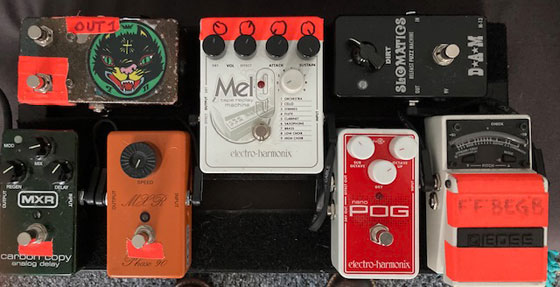
Do you have a guitar, amp or pedal that you have had for a long time and will never part with?
I’ve used that old Gibson SG for almost 20 years, it’s battered and modded beyond recognition but still my favourite guitar. It cost me the princely sum of £150 and given the state of it, it’s probably worth about the same now, but it will always be a keeper. Same thing with my old DAM Meathead, it’s the original that the current ones are based on and is on every recording we’ve done. I’m pretty sure Chris would run into a burning building for his Les Paul – he’s more or less completely devalued it by modifying the thing beyond recognition, but it’s still his favourite guitar.
Thanks for taking time out of your busy schedule to answer my questions. I really appreciate it! Is there anything else you would like to add?
Just to say thank you for taking the time to do this – I’ve really enjoyed reading this series. We’ve a new record out on Black Bow Records in March, it’s a split with Ungraven, so if anyone wants to hear what all this equipment I’ve been banging on about sounds like, that’s as good a way as any. Thank you!
Slomatics latest release, a split with Ungraven (if you missed it, check out Lee B’s review) is out today, 5th March, via Black Bow Records and can be purchased over on Bandcamp.
Label: Black Bow Records
Band Links: Official | Facebook | Bandcamp | Twitter | Instagram
Interviewed by: Josh Schneider

